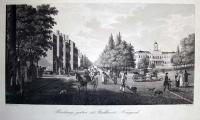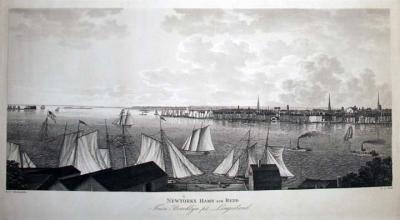Axel Klinkowström (1775-1837), engraved by Carl Fredrik Akrell (1779-1868), Newyorks Hamn och Redd, från Brooklyn på Longisland (published in Klinkowstöm’s Atlas, Stockholm, 1824). Gift of Leonard L. Milberg, class of 1953. Graphic Arts
 Axel Klinkowström (1775-1837), engraved by Carl Fredrik Akrell (1779-1868), Brodway gatan och Rådhuset i New York (published in Klinkowstöm’s Atlas, Stockholm, 1824). Gift of Leonard L. Milberg, class of 1953. Graphic Arts
Axel Klinkowström (1775-1837), engraved by Carl Fredrik Akrell (1779-1868), Brodway gatan och Rådhuset i New York (published in Klinkowstöm’s Atlas, Stockholm, 1824). Gift of Leonard L. Milberg, class of 1953. Graphic Arts
Swedish Baron Axel Leonhard Klinkowström (or Klinckowström) became an ensign at the age of 17 and rose to Lieutenant-Colonel. It was in detached service from the naval fleet that he visited the United States from 1818 to 1820. The purpose of his trip was to investigate the American steamboat and study its possibilities for use by the Swedish navy.
During these two years in America, Klinkowström wrote 25 illustrated letters home to Admiral Claes Cronstedt and the Swedish public, which were published in 1924 under the title Bref om de Förenta Staterna (EX Oversize 1053.527.1824E, 2 v.+ atlas) and translated into English in 1957 as Baron Klinkowström’s America, 1818-1820 (Recap 1053.527)
Here are a few excerpts:
The harbor is full of small sailing vessels, yachts, and schooners which come from all America’s ports to this mid-point of all movement. Usually these ships are well-painted and are built in a light and handsome style. The steamboats which come and go like stagecoaches add great activity to this picture. Behind the city itself the great Hudson River empties into the harbor, which is large and reaches as far as New Jersey. This grand panorama is bounded by the New Jersey coast and the highlands on the other side of the Hudson.
…I want to advise any travelers who plan to stay in this country for a while not to live in expensive hotels. Everywhere, and especially here in New York, there are boarding houses where one can lodge comfortably and enjoy adequate board at varying rates. The advantage of these boarding houses over hotels is that one lives in closed company which is pleasant, for the guest are people with some education and with whom one can become acquainted. Breakfast is served at nine o’clock, after which each one goes to his duties. Dinner is served at four or five and then the guests gather in the living room before a glowing fire where the evening is spent in card playing, games, or merriment.
…According to what I have found, people here show more respect for the laws than they do in Europe, and do not require such strong measures to govern and maintain authority. Although the American people are compounded from different nations, although different tongues are spoken and different religious sects exist, less grave crimes are committed…than in Europe. Contrast this with conditions in Southern Europe, where, despite watchful police and strong armies and severe punishment, it is still not always possible to protect the peaceful citizen…
